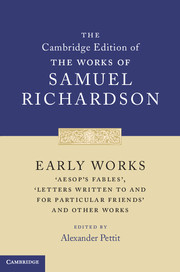Book contents
- Frontmatter
- Dedication
- Contents
- General Editors’ Preface
- Acknowledgements
- Chronology
- List of Abbreviations
- General Introduction
- Textual Introduction
- The Apprentice’s Vade Mecum (1733)
- A Seasonable Examination of the Pleas and Pretensions (1735)
- Preface to Aubin, A Collection of Entertaining Histories and Novels (1739)
- Aesop’s Fables (1739)
- Letters Written to and for Particular Friends (1741)
- Six Original Letters Upon Duelling (1765)
- Appendix: The Infidel Convicted (1731)
- Postscript
- Emendations
- Word-division
- Bibliographical Descriptions of Early Editions
- Explanatory Notes
- Index
Letter CXXX
Published online by Cambridge University Press: 30 June 2022
- Frontmatter
- Dedication
- Contents
- General Editors’ Preface
- Acknowledgements
- Chronology
- List of Abbreviations
- General Introduction
- Textual Introduction
- The Apprentice’s Vade Mecum (1733)
- A Seasonable Examination of the Pleas and Pretensions (1735)
- Preface to Aubin, A Collection of Entertaining Histories and Novels (1739)
- Aesop’s Fables (1739)
- Letters Written to and for Particular Friends (1741)
- Six Original Letters Upon Duelling (1765)
- Appendix: The Infidel Convicted (1731)
- Postscript
- Emendations
- Word-division
- Bibliographical Descriptions of Early Editions
- Explanatory Notes
- Index
Summary
To a Father, on his Neglect of his Childrens Education.
Dear Sir,
I am under a Concern to see such a Remissness as every body takes notice of, in the Education of your Children. They are brought up, ‘tis true, to little Offices in your Business, which keep them active, and may make them in some degree of present, tho’ poor Use to you; but, I am sorry to say, of none to themselves, with regard to their future Prospects, which is what a worthy Parent always has in View.
There is a proper Time for every thing; and if Children are not early initiated into their Duty, and those Parts of Learning which are proper to their particular Years, they must necessarily be discouraged, and set behind every one of their Schoolfellows, tho’ much younger than themselves; and you know not, Sir, what a laudable Emulation you by this means destroy, than which nothing is of greater Force to Children, to induce them to attend to their Book; nor what a Disgrace you involve them in with respect to Children among Children, for the Biggest and Eldest to be so much out-done by the Least and Youngest.
Nor is the Consequence of this Defect confin’d to the School-age, as I may call it; for as they grow up, they will be look’d upon in an equally discouraging and disadvantageous Light, by all who converse with them: Which must of course throw them into the Company of the Dregs of Mankind; for how will they be able to converse or correspond with those whose Acquaintance it is most worth their while to cultivate? And indeed they will probably be so conscious of their Unfitness to bear a Part in worthy Conversation, that, to keep themselves in Countenance, they will, of their own Accord, shun the better Company, and associate with the worst: And what may be the Consequence of this, a wise Man, and a good Father, would tremble to think of, especially when he has to reflect upon himself as the Cause of it, let it be what it will.
- Type
- Chapter
- Information
- Early Works'Aesop's Fables', 'Letters Written to and for Particular Friends' and Other Works, pp. 454 - 456Publisher: Cambridge University PressPrint publication year: 2011

